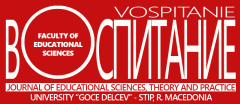A CONTRASTIVE STUDY OF GERMAN AND MACEDONIAN PROVERBS AND SAYINGS WITH AN ANIMAL COMPONENT
Abstract
There is a lot of information and testimonies about proverbs and sayings (PSs), about their existence, duration and about their significant role in everyday life. Thanks to the global approach to scientific knowledge, we can be convinced of the unusual power of PSs, of their penetration into all spheres of society, of human activity and of their distribution. It is their popularity that has attracted our interest and pulled us into the labyrinths of language; to make the research topic more original and vivid, we inserted the animalisms through which human character traits and wisdoms are transmitted.
This contrastive paper deals with the analysis of German PSs with an animal component and their Macedonian equivalents. We tried to determine the animal component that is most represented in German and Macedonian PSs, i.e., whether it is the same component or a completely different one. During our research, we tried to give an answer to questions as: Do PSs from the two languages have some similarities despite the different language groups they belong and do they have common elements? For an adequate and relevant answer, we first tried to define the terms proverb and saying and explain their similarities and differences.
References
- - - - - - - - - - - -- -- (2009). Македонски пословици и поговорки. кн.73. Институт за фолклор „Марко Цепенков“. Скопје;
Кузмановска, Д., Кирова, С. и Иванова, Б. (2015). Еквивалентност помеѓу поговорките и пословиците во македонскиот, германскиот и англискиот јазик. In: Јазичната слика на светот, 23-24 Apr 2015, Skopje, Macedonia.
Кузмановска, Д., Иванова, Б. и Ничева, В. (2014). Успешен трансфер на поговорките и пословиците од еден во друг јазик. Годишен зборник 2013 - Филолошки факултет, УГД - Штип. ISSN 1857-7059
Ляцкий, E. A. (1847). Несколяико замечаний к вопросу о пословицах и поговорках, СПб.
Никодиновски, З. (1992). Фигуративните значења на анималната лексика во францускиот и во македонскиот јазик: Инсекти, докторска дисертација, Филолошки факултет „Блаже Конески“, Скопје.
Пермяко́в, Г. Л. (1985). 300 общеупотребительных русских пословиц и поговорок. Москва;
Пермяко́в, Г. Л. (1970). „От поговорки до сказки: заметки по общий теории клише“, Исследования по фольклору и мифологии Востока.
Поп Јовановски, А. (1991). Македонски народни пословици. Студентски збор, Скопје.
Сергеевна, A.O. (1989). Словар лингвистичесних терминов, Советская энциклопедия.
DUDEN (1998). Redewendungen und sprichwörtliche Redensarten. Wörterbuch der deutschen Idiomatik. Bearb. v. G. Drosdowski u. W. Scholze- Stubenrecht. Mannheim/Leipzig/Wien/Zürich;
Friedrich, W. (1976). Moderne deutsche Idiomatik. Alphabetisches Wörterbuch mit Definitionen und Beispiele. 2 neubearbeitete Auflage. Max Hueber Verlag. München;
Schemann, H. (1991). Synonymwörterbuch der deutschen Redensarten. Unter Mitarb. v. R. Birkenhauer, Stuttgart- Dresden
Petkovska,B., Kirova, S., Koceva,D., (2012): Investigation of motivation and anxiety in Mace-donia while learning English as a second/foreign language. WCES – Barcelona, Spain 2012
Copyright (c) 2022 Воспитание / Vospitanie - Journal of Educational Sciences, Theory and Practice

This work is licensed under a Creative Commons Attribution 4.0 International License.






